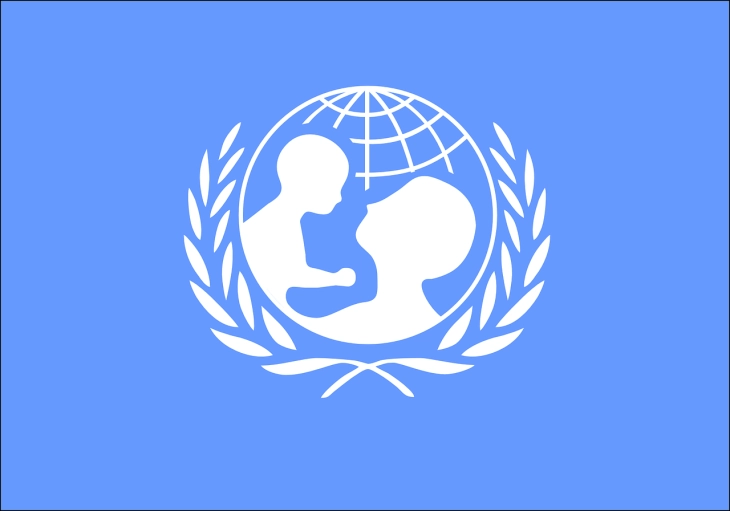UNICEF: Children constitute 70 per cent of all identified victims of human trafficking from North Macedonia
- While child victims of trafficking frequently remain undetected and unreported worldwide, available data from the National Commission for Combating Human Trafficking and Illegal Migration spanning two-decades (2001-2021), shows that children constitute 70 per cent of the victims in North Macedonia, the UNICEF Office in Skopje said in a press release on the World Day Against Trafficking in Persons, which this year focuses on the vulnerability of children and urges accelerated action to end child trafficking.
- Post By Nevenka Nikolik
- 11:49, 30 July, 2024

Skopje, 30 July 2024 (MIA) - While child victims of trafficking frequently remain undetected and unreported worldwide, available data from the National Commission for Combating Human Trafficking and Illegal Migration spanning two-decades (2001-2021), shows that children constitute 70 per cent of the victims in North Macedonia, the UNICEF Office in Skopje said in a press release on the World Day Against Trafficking in Persons, which this year focuses on the vulnerability of children and urges accelerated action to end child trafficking.
"This figure significantly exceeds the global estimate, where nearly one-third of all identified human trafficking victims are children. Notably, the average age of child victims in the country is 15 years, with girls being disproportionately affected, often subjected to dual forms of exploitation: both sexual and labour. This alarming prevalence, particularly among young girls, underscores a disturbing trend that is exacerbated by the digital age," reads the press release, adding that UNICEF calls for more investment in efforts to prevent the exploitation and abuse of children and safeguard their rights to protection.

Traffickers globally, the press release notes, have exploited technological advances to operate more covertly and increase their profitability. The national Subgroup on Combating Child Trafficking reports that traffickers are increasingly targeting children via technology, with international organized crime groups and online predators.
"Recognising the continued efforts by national partners to shield children from trafficking, the situation calls for greater commitment and investment to enhance prevention, protection, prosecution, and partnerships," says the UNICEF Office in Skopje.
UNICEF recommends to increase investments in child protection systems and services to tackle the root causes of child trafficking. Poverty, family dysfunction and discrimination put children at greater risk of becoming victims of trafficking. Failure to enforce child protection and labour laws additionally perpetuates the situation. Prevention support and services must include access to social protection, health and education for children and their families.

"Strengthen capacities to detect and protect child victims of trafficking including those ‘at-risk’ of trafficking. The absence of long-term assistance, rehabilitation and over reliance of placing children in inadequate shelters, leaves children at risk of further traumatization and re-victimization. Improved identification mechanisms and provision of sustainable solutions for vulnerable children are urgently required, as well as additional investment to ensure that the child protection system offers appropriate guardianship and other alternative care arrangements," reads the press release.
Another recommendation is to enhance capacities to ensure that children receive access to justice and that perpetrators are prosecuted. Investments are needed to implement existing laws, including procedures for the investigation, storage, and preservation of electronic evidence. This requires continued investment in building the capacities of prosecutors, prosecutorial units, the judiciary, specialist police, and other relevant professionals and practitioners to deal with new challenges in technology-facilitated exploitation and abuse.
The UNICEF Office in Skopje also calls for fostering multi-sectoral partnerships in the fight to eradicate child trafficking. Collaboration with civil society, child survivors and survivor-led groups is key to ensuring child-friendly, trauma-informed prevention strategies and response systems.
"Cross-border collaboration and collaboration with tech companies are needed to ensure efforts also address new risks. Engagement with communities and at-risk groups of children and adolescents is essential to increasing awareness of the dangers of human trafficking, as is dissemination of practical information on how to report incidents and seek help. Child trafficking can be prevented, and survivors must be offered protection and access to justice. Trafficked children endure unimaginable realities and are often subjected to severe exploitation and abuse. Undetected and unprotected, they remain invisible, deprived of care and support, denied justice, and all too often, trapped in an excruciating cycle of abuse and exploitation into adulthood," the press release reads.

UNICEF, it adds, remains committed to supporting government efforts in catalysing multi-sectoral action to strengthen legislative and policy frameworks, criminal justice responses, victim support, and education programmes. By training professionals in child protection and justice systems, UNICEF aims to provide trauma-informed care to survivors and further improve data management on child trafficking cases.
"Only through a united and intensified effort can the country ensure that every child is protected, and that no child is left behind in the fight against human trafficking. On this World Day Against Trafficking in Persons, as the global community unites under the theme “Leave No Child Behind in the Fight Against Human Trafficking”, UNICEF calls for more investment in efforts to prevent the exploitation and abuse of children and safeguard their rights to protection," the UNICEF Office in Skopje said.
Photo: MIA archive







